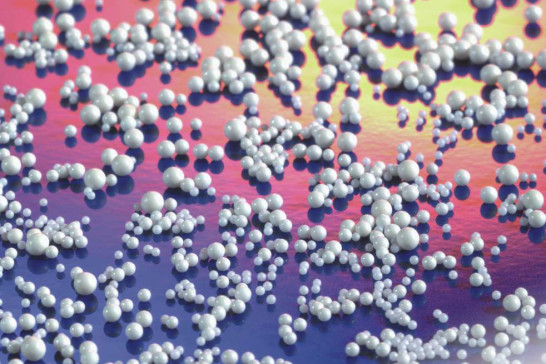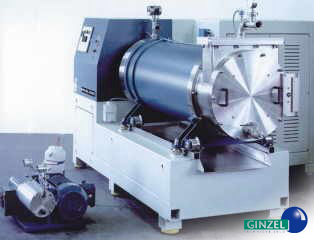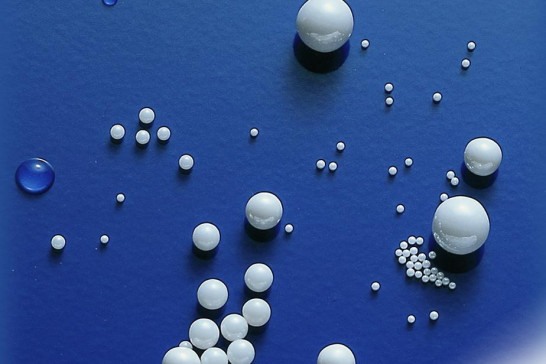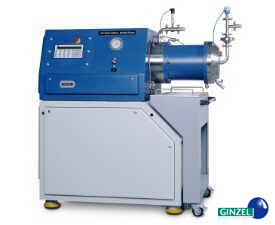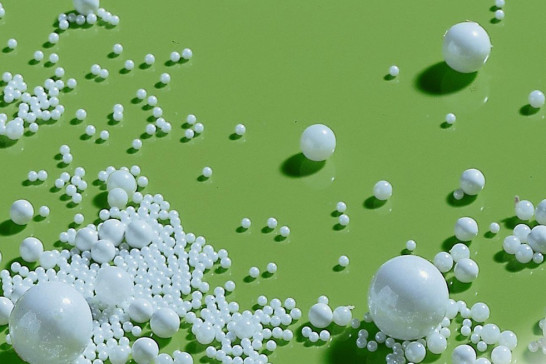The use of ceramic beads is suprisingly widespread. There are many applications for varying sizes of ceramic beads.
Ceramic beads are divided not only according to size or fraction range but also according to base ceramic material. Ceramic beads are becoming standard for the production of many types of products, replacing glass beads in many applications providing efficiency performance and economic benefits.
It is necessary to calculate not only the initial cost of filling each device, but also the durability and quality of the final product. Ceramic beads are more durable than standard glass beads. They are stronger and more symmetrical and have no glass debris which can depreciate products. This helps when grinding colours and grinding substances for the food and pharmaceutical industries.
As with glass beads, there are many types of ceramic beads with different uses.
Ceramic balls are used for dyes in the paint manufacture industry.
It should be noted that every manufacturer of homogenization mills – Germany Netzsch (MLK, LME, LMZ), Swiss Willy A.Bachofen (Dyno Mill KD, ECM), and another Swiss Hubhler (DCP Superflow, Supertex), Polish Profarb or Czech ProChema construct all their mills to be able to use ceramic balls. It means their the engines are strong enough and the material of encasement and grinding blades or discs matches the density of ceramic balls such as zirconium-oxide ceramic balls, whose density is higher than 6 g/cm3. Therefore, the use of ceramic balls for beads mills means a heavy load. Bead mills which operate with gradual speed increasing electric motors, which allow continuous input of beads, are already common place.
If you love good chocolate, ceramic balls also used in the production of finest chocolates, as are steel and glass balls. Dispersion of material by use of ceramic balls provides an excellent taste to the best chocolate. Ceramic balls cannot be used with all technical production methods, so borosilicate balls are sometimes used in the food industry due to their low density (2,23 g/cm3) and lower grinding power (kinetic energy) compared to ceramic balls. Both ceramic and glass balls are used throughout the chemical industry, for example, ceramic balls of aluminium oxide Al2O3 are used as catalysts for petroleum cracking.
The heaviest ceramic balls cannot be used in some, mostly older, grinding and dispersion equipment. We offer a wide rande of ceramic balls with different properties and weights. For example, balls made from so-called zirconium glass, which we brand as 'GZ', are used as an excellent transition to higher efficiency, older homogenization technology. The specific weight of zirconium glass is 3,0 g/cm3 and has a higher kinetic energy than standard glass for the contents of the bead mill.
Another type of ceramic ball is made from zirconium-silicate which we brand and sell as 'Z' and 'ZS'. The specific weight of 'Z' and 'ZS' is 3,8 g/cm3 and 4,1 g/cm3 respectively. 'ZS' balls are produced by so-called 'sintering', which is when the ball is molded cold and hardened by heating. These cutting-edge methods of production largely strip out microscopic surface irregularities on the surface of spheres, which can break off and then feed back into the homogenized product and, in some cases, seriously degrade it.
We also offer ceramic balls branded as 'ZY', manufactured from basic zirconium oxide which has a higher density of 6,0 g/cm3. 'ZY' balls are used in the latest modern bead mills with sufficient cooling capacity.
Ceramic grinding zirconium-oxide balls which we brand and sell as 'ZY Premium' are commonly used in precision laboratories and factories in the pharmaceutical industry.
'ZY' beads are very powerful and durable, which attracts a premium price, so we also offer a lower-priced recycling service (together with producer Sigmund Lindner) where we can send your used 'ZY' cartridges to SiLi to sort into various accurate size ranges (eg 1,4 to 1,6 mm) and then return to you.
We understand that the world of grinding ceramic balls is complex and can be confusing to customers. We therefore pride our service on a solution-based approach to individual customer requests, to ensure we fully meet your individual requirements. We offer a full consultation process with our customers to make sure we use the most appropriate technical methods to do "the best job at the right price".
We represent Sigmund Lindner GmbH (SiLi) in the Czech Republic and the Slovak Republic. This gives us vast and valuable shared world-wide customer experience, knowledge and best-practise. This enables us to offer our customers the best world class solutions at competitive prices. We are therefore unique in the Czech Republic and Slovak Republic in this regard.
Feel free to contact our team using the following link.



